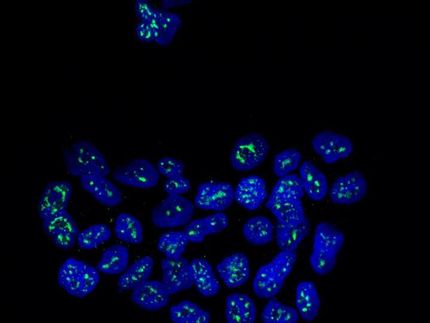Too much of a good thing: Important mechanism in hormone-sensitive breast cancer uncovered
Two thirds of breast cancers are ERalpha-positive, i.e., many estrogen receptors of the ERalpha- type are found in their cells. "These molecules can interact with the estrogen hormone and, thus, even lead to cancer," explains Dr. Joerg Hoheisel; molecular biologist at DKFZ. "The connection between the levels of the estrogen receptor alpha and the occurrence of breast cancer has been known for some time now. Early-stage breast cancer cells already produce too many of these receptors. This is associated with increased cell division, which is ultimately responsible for tumor development," says Hoheisel.
Jointly with his coworkers, Dr. Yasser Riazalhosseini and Pedro de Souza Rocha Simonini, Joerg Hoheisel has now been able to show that a tiny little nucleic acid, a microRNA known as miR-375, causes the high receptor levels which, in many cases, lead to cancer. MicroRNAs are important intracellular signal mediators, which have a substantial influence on the effectiveness of genes. The DKFZ group discovered that miR-375 blocks the production of an enzyme which influences the production of ERalpha-receptors. Thus, high levels of miR-375 lead to production of many estrogen receptors. At the same time, elevated ERalpha-levels lead to production of more miR-375. This feedback loop further boosts the multiplication of cancer cells.
The research group headed by Joerg Hoheisel has now published the results of their experiments in the journal Cancer Research . They also present a first indication of a possible medical application of the newly gained knowledge: "We were able to block the miR-375 microRNA in ERalha-positive breast cancer cells. This effectively slowed down cancer cell growth." Whether and how miR-375 will play a role in breast cancer treatment in the future is a question which Hoheisel cannot answer yet. "But we hope to be able to use our results in the future for developing new strategies against tumors with too many estrogen receptors."
Original publication: de Souza Rocha Simonini P, Breiling A, Gupta N, Malekpour M, Youns M, Omranipour R, Malekpour F, Volinia S, Croce CM, Najmabadi H, Diederichs S, Sahin O, Mayer D, Lyko F, Hoheisel JD, Riazalhosseini Y.: "Epigenetically Deregulated microRNA-375 Is Involved in a Positive Feedback Loop with Estrogen Receptor alpha in Breast Cancer Cells."; Cancer Research 2010.
Organizations
Other news from the department science

Get the life science industry in your inbox
By submitting this form you agree that LUMITOS AG will send you the newsletter(s) selected above by email. Your data will not be passed on to third parties. Your data will be stored and processed in accordance with our data protection regulations. LUMITOS may contact you by email for the purpose of advertising or market and opinion surveys. You can revoke your consent at any time without giving reasons to LUMITOS AG, Ernst-Augustin-Str. 2, 12489 Berlin, Germany or by e-mail at revoke@lumitos.com with effect for the future. In addition, each email contains a link to unsubscribe from the corresponding newsletter.


















































